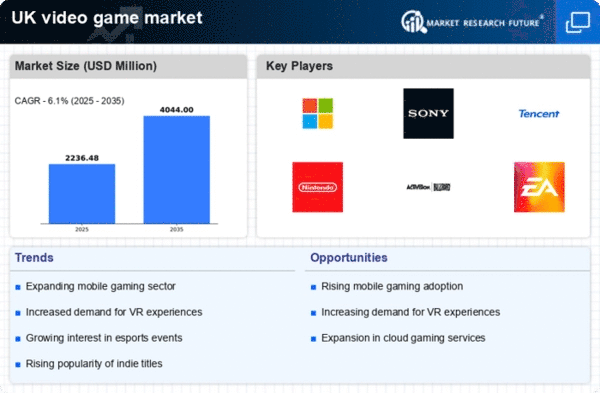Mobile Gaming Proliferation
Mobile gaming has emerged as a dominant force within the video game market, particularly in the UK. With over 50% of gamers engaging in mobile gaming, the accessibility and convenience of smartphones have contributed to this trend. The market for mobile games is expected to reach £2 billion by 2025, driven by the increasing availability of high-quality games and in-app purchases. This growth is indicative of a broader shift in consumer preferences, as players seek gaming experiences that fit into their busy lifestyles. As mobile technology continues to advance, it is anticipated that the video game market will further capitalize on this trend, potentially leading to innovative gaming formats and monetization strategies.
Diverse Game Genres and Content
The video game market is witnessing a diversification of game genres and content, catering to a wider audience. This trend is characterized by the emergence of indie games, narrative-driven experiences, and educational games, appealing to various demographics. The increasing representation of different cultures and themes in gaming content is also noteworthy, as it resonates with a broader player base. In the UK, the market for indie games has grown by approximately 30% in the last year, indicating a shift in consumer preferences towards unique and innovative gaming experiences. As the video game market continues to evolve, this diversification is likely to attract new players and foster a more inclusive gaming environment.
E-sports and Competitive Gaming
The rise of e-sports has significantly impacted the video game market, transforming gaming into a spectator sport. With millions of viewers tuning in to watch competitive gaming events, the e-sports industry is projected to generate revenues exceeding £1 billion by 2026. This growth is fueled by sponsorships, advertising, and ticket sales, indicating a robust interest in competitive gaming. The UK has become a hub for e-sports tournaments, attracting both players and fans. This trend not only boosts game sales but also encourages developers to create titles that cater to competitive play. As e-sports continues to gain popularity, it is likely to play a pivotal role in shaping the future of the video game market.
Technological Advancements in Gaming
The video game market is experiencing rapid technological advancements that are reshaping the gaming landscape. Innovations in graphics, processing power, and virtual reality (VR) are enhancing user experiences. For instance, the introduction of next-generation consoles has led to a surge in high-definition gaming, with the market witnessing a growth of approximately 20% in hardware sales in the past year. Furthermore, cloud gaming technology is gaining traction, allowing players to access games without the need for high-end hardware. This shift is likely to attract a broader audience, thereby expanding the video game market. As technology continues to evolve, it is anticipated that the demand for immersive gaming experiences will further drive market growth in the UK.
Social Connectivity and Online Multiplayer
The video game market is focusing on social connectivity. Online multiplayer experiences are becoming a central feature of many games. The rise of social gaming platforms has enabled players to connect and compete with friends and others globally. This trend is reflected in the growing popularity of games that emphasize cooperative play and community engagement. Approximately 70% of gamers in the UK participate in online multiplayer games, highlighting the demand for social interaction within gaming. As developers continue to prioritize online features, the video game market is likely to see sustained growth, driven by the desire for shared experiences and community building among players.
















